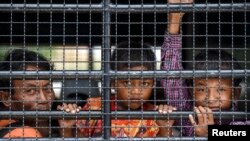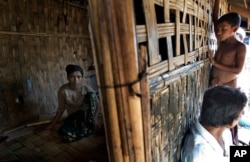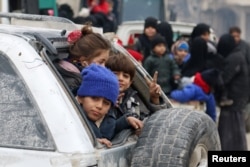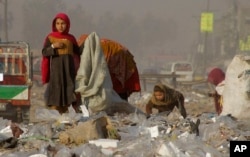The United Nations warns that conflict and poverty are fueling human trafficking and modern slavery, putting $150 billion a year into the coffers of organized crime worldwide.
“Trafficking networks have gone global,” U.N. Secretary-General Antonio Guterres told the Security Council on Wednesday during a special session on the issue. He said victims can be found in 106 countries.
Some 21 million people are estimated to be victims, used as forced labor, sex slaves, coerced into prostitution, or involuntarily recruited into armed groups. Some even have had their organs removed by traffickers to sell on the illegal transplant market.
“For organized crime networks, human trafficking is a low-risk, high-reward criminal business,” said Yury Fedotov, head of the U.N. Office of Drugs and Crime. He said low conviction rates for perpetrators let traffickers operate with near-impunity.
The conflicts in Syria, Afghanistan, Somalia and elsewhere are churning out millions of desperate and vulnerable people susceptible to traffickers.
Somali human rights campaigner Ilwad Elman told the council that in her country, women and young children are trafficked for domestic work, forced prostitution and even organ removal.
“Conflict and insecurity breed desperation, and traffickers present themselves as a ticket out of all of that,” she said via a video link from Mogadishu.
“Erosion of the rule of law enables transnational trafficking networks to act with impunity,” Britain’s Independent Anti-slavery Commissioner Kevin Hyland told the Security Council.
Slave trade ‘booming’ in Libya
“Europol has confirmed that traffickers are increasingly targeting refugees in the EU,” Hyland said, referring to the European Union’s law enforcement agency. “And nearly half of all refugees are children, many of whom are unaccompanied and, therefore, especially vulnerable.”
He told of meeting a 15-year-old Eritrean girl at a refugee reception center on the Italian island of Lampedusa. She had been kidnapped and held for three months in Libya in a “connection house” where she was raped multiple times a day.
“A modern-day slave trade is now booming in Libya,” Hyland warned. “Political, military and social conditions have created an environment where traffickers have thrived.”
According to the International Organization for Migration, more than 70 percent of migrants moving from North Africa to Europe have experienced exploitation and human trafficking, mainly in Libya.
Terror groups, including Islamic State and Boko Haram, also engage in enslavement and forced labor, while drug traffickers use kidnapping and ransom to finance their operations.
The current refugee and migration crisis is a boon to traffickers.
“As people take to the road, predators take advantage,” Secretary-General Guterres said. Refugee camps have become a fertile hunting ground for traffickers to find new victims.
No borders
But trafficking can happen far from conflict zones, as well.
“No country is immune from this crisis,” U.S. Ambassador to the United Nations Nikki Haley said. “That includes the United States, where, despite our efforts to combat human trafficking, too many people are still falling victim to criminals who force them into prostitution or other types of work with no pay and no way out.”
Haley noted that traffickers are using technology and the internet to their advantage in the recruiting and selling of people.
President Donald Trump's administration is committed to ending this “absolutely horrific practice,” she said, and is about to launch a new initiative to raise $1.5 billion to help countries break up trafficking rings and assist survivors.
“The funding will come partly from the U.S. government, but unlike most assistance programs, the initiative will seek to raise most of its money from partners in foreign governments and in the private sector.”
Ending modern slavery must be a collective effort, Haley said, and she pledged that the new initiative would spend its money on programs that “show results.”
“Groups that receive funding must set measurable goals, and they must target a 50-percent reduction in modern slavery for the population they will be working with,” she said.
Prevention efforts
The secretary-general made clear there is much that states can do to both punish and prevent human trafficking.
He said a solid legal framework already is in place, including the U.N. Convention Against Transnational Crime, and conventions from the International Labor Organization and the Global Plan of Action on Human Trafficking.
States also need to strengthen cooperation and coordination on law enforcement, investigations and intelligence sharing, Guterres said.
“At the same time, we need to get at the underlying vulnerabilities that fuel this phenomenon,” the U.N. chief added, “by empowering girls through education, by respecting the rights of minorities and by establishing safe and legal channels of migration.”







